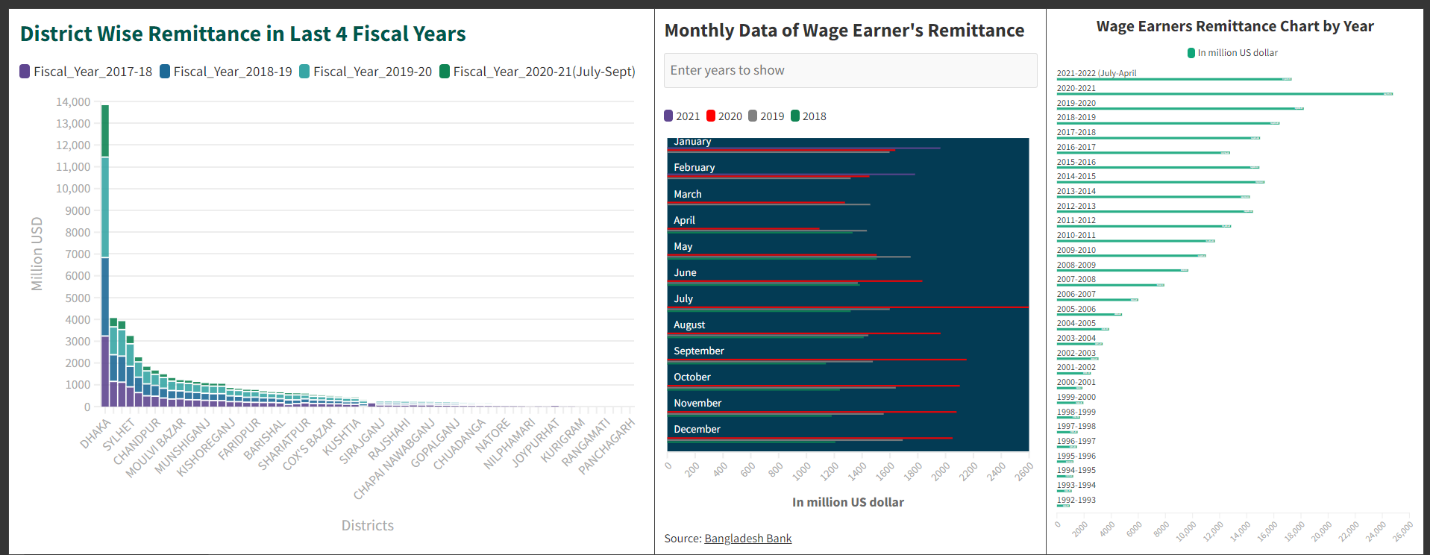 Socioeconomic Dashboard
Informed policymaking for Covid-19 recovery
Socioeconomic Dashboard
Informed policymaking for Covid-19 recovery

Challenges
The COVID-19 pandemic has brought significant changes in human behavior, planning, and lifestyle. When the World Health Organization (WHO) declared this COVID-19 a global pandemic, governments, especially in the global South, were mostly unprepared to handle its impacts. In addition to claiming millions of lives, this virus has also brought various socioeconomic impacts. More than a health crisis, the pandemic has produced devastating consequences on social protection, employment, and many other socioeconomic aspects around the globe.
Like other countries, Bangladesh has suffered the multidimensional impacts of COVID-19. Also similarly to what happened in other parts of the world, the country suffered with a lack of information that would allow the Government to make immediate, data-driven policy decisions to contain the spread of the virus and reduce its impacts.
Towards a Solution
Based on the guidelines and indicators mentioned in the Bangladesh Preparedness and Response Plan (BPRP) and the United Nations Immediate Socio-economic Response Plan (UN ISERP), this project aimed to develop an intelligence dashboard on COVID-19 impact and recovery management. The project deployed artificial intelligence and machine learning, as well as other emerging technologies and tools, in order to tailor government response to the needs of the beneficiaries and response agencies and support informed and responsible decision-making, and better management the impacts of the pandemic in Bangladesh.
The Aspire to Innovate (a2i) Programme presented the dashboard during the National Data Coordination Committee (NDCC) meeting and relevant government offices agreed on its importance. The dashboard was then presented during a meeting of the SDG Technical Working Committee, which was led by the Director General of Bangladesh Bureau of Statistics. During the meeting government stakeholders discussed the importance of such dashboard that can present the impact and guide them for better recovery from COVID-19, and the Committee approved its integration into the SDG Tracker as a new tab named “COVID-19 Recovery”.
One key lesson learned from the initiative is the effectiveness of government collaboration. Since the implementation project happened during the period of the pandemic, it was necessary to establish engagement and ownership of government policymakers from the beginning. From the developmental phase of the dashboard, the relevant government agencies were mapped and communicated to ensure the real picture of the data requirement was captured. It also helped in the generation of necessary policy insights. Otherwise, it would have been really difficult to achieve such remarkable progress during a short period of time.
Another lesson is the use of the proxy indicator. Data-driven insight is a major component of any sort of decision-making. But sometimes, data isn’t available according to the required indicator framework. In those cases, the use of available proxy indicators can be of significant assistance in insight generation and decision process.
Another major takeaway is the understanding of the importance that non-government data has in capturing the total analytical picture for policymaking. Sometimes, administrative data availability comes under a lot of restraints. This hampers the overall data-driven decision-making and subsequent policy-making process. If non-government data such as research organizations’ data, academic data can be used in alignment with existing government data, it can play a vital role in government decision-making.
Contact Information
Countries involved
Supported by
Implementing Entities
Project Status
Project Period
URL of the practice
Primary SDG
Primary SDG Targets
Secondary SDGs
Secondary SDG Targets
Similar Solutions
| NAME OF SOLUTION | Countries | SDG | Project Status | |
|---|---|---|---|---|
360-Degree Awareness Tool to Fight COVID-19 Raising awareness and ensuring public wellbeing through a one-stop platform for fighting COVID-19 in Bangladesh |
Bangladesh | 16 - Peace and Justice Strong Institutions | Ongoing | View Details |
A-Card Initiative |
Bangladesh | 10 - Reduced Inequalities | Completed | View Details |
Accelerating Digital Transformation in All Ministries in Bangladesh Promoting the rapid design and implementation of plans to digitize all ministries and subordinate government institutions in Bangladesh |
Bangladesh | 10 - Reduced Inequalities | Ongoing | View Details |
Accelerator Labs Network Following collective intelligence methods to address emerging sustainability challenges and the growing demand for local solutions |
Bangladesh | 08 - Decent Work and Economic Growth 13 - Climate Action | Ongoing | View Details |
Accessibility ToolKit Promoting accessibility as a cornerstone for inclusive digital development in Bangladesh. |
Bangladesh | 08 - Decent Work and Economic Growth | Completed | View Details |
